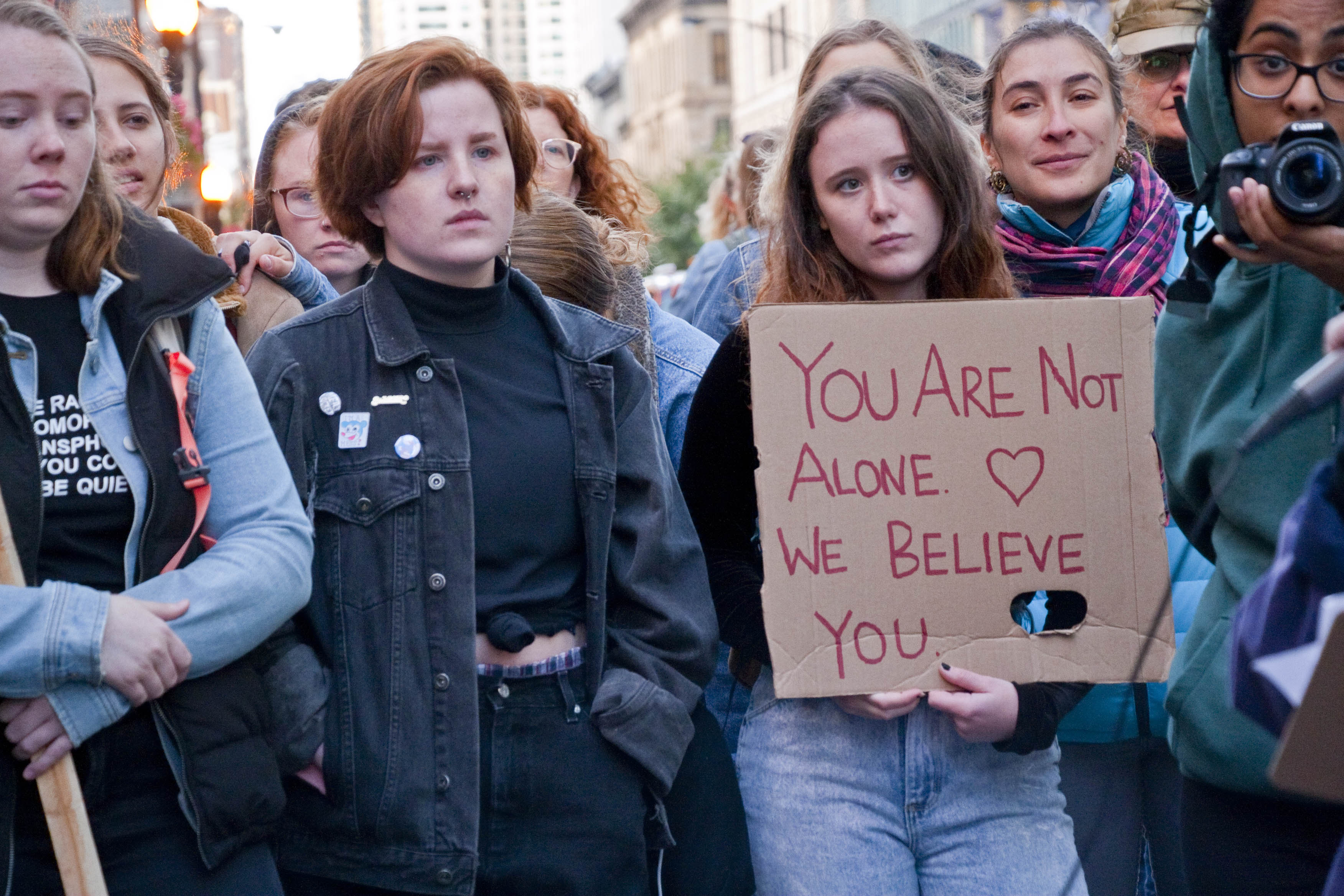Image: “Protesting Brett Kavanaugh Chicago Illinois 10-4-18 4354” by Charles Edward Miller is licensed under CC BY-SA 2.0.
It’s nothing short of common knowledge that everybody has a story. Everybody has a certain “something” that defines us whether we bring this “something” to the light, or keep it locked away behind our teeth. It’s too easy to keep our skeletons locked away – and despite the fact that the American Psychological Association urges us to talk about our problems, so many people don’t want to or find that they can’t.
Often times, this issue of openness frames itself in the topic of sexual assault and harassment, a traumatizing experience with a deeply controversial socio-political history of victim-blaming, gender bias and trivialization. We’re lucky to live in an age that this topic has become relevant and spoken as a real, terrifying problem that disproportionately affects women across the world. When the problem doesn’t fit the spoken narrative – or when victims still don’t know where or how to talk about their problem – there still remains the issue with the conversation as a whole. This terrifyingly common atrocity is still stigmatized, even in today’s world, simply because people don’t know where, how or if they can share their stories.
‘When I think about this issue, I think about the victims who consent to situations and then are tricked into thinking this means they should consent to others. I think about the myths of pain and pleasure and those who think they are consenting to sex but are only consenting to validation of one’s own beauty and maturity.’
“I wasn’t raped, but … ” is, perhaps, the scariest thing I can hear for so many reasons. It makes my chest hurt. For one thing, it keeps the victim in the cycle of trauma. The thought process is often one of many terrifying circles; “I wasn’t ‘actually’ raped, so my story doesn’t count. I wasn’t ‘actually’ raped, so I need to get over it. I wasn’t ‘actually’ raped, so I don’t have a space to share my story.” There are endless reasons why this is infinitely harmful, but for no other reason than this creates the issue of eliminating the spaces for people to talk about their experiences, it’s terrifying all on its own. It places the responsibility on the victim to create their “own space” where they feel like they are “allowed” to speak of their story when the social narrative of sexual assault and harassment fits a stricter mold.
When I think about this issue, I think about the victims who consent to situations and then are tricked into thinking this means they should consent to others. I think about the myths of pain and pleasure and those who think they are consenting to sex but are only consenting to validation of one’s own beauty and maturity. I think of the men and women who forced themselves into discomfort, of the people who have been told to consider “both sides,” of the ones consenting to a social or religious expectation.
And, sometimes, it’s a matter of space – which spaces and circles can accept these stories? How can these experiences be heard? Do stories of raw, unfiltered trauma make people too uncomfortable for “established” presses and spaces to accept these narratives? If someone is violated, and they never had the conversation that so many women have, surrounded by the countless horror stories put into careful words, how might they know how to use their own voice to break their silence? Who would accept this voice? Who accepts the voice of a person where their discomfort is not only expected but celebrated?
Spaces are less accepting of the words that fall outside the mold. They want the words that continue the narrative, with artfully placed “challenges” of the system that are only as intelligent as they are accessible. Accessibility will always come first in the acceptance of these stories – without it, we would have no narrative to begin with. We insist on comfort, on routine, on common knowledge.
I wish there was a solution – more than just the Women’s Center, more than just the Counseling Center – I wish there was a space for all people who still don’t understand what happened to them, who are angry and sad and heavy drinkers and lost souls whose stories are easy to brush aside, to thrust their stories in our faces, in unavoidable ink. I wish there were spaces for the boys who were told this would never happen to them because their gender would protect them. I wish there were spaces for stories of the uncomfortable narratives, raw and bloody with the trauma and anger and deep sadness that they bring.
These are the narratives that we don’t want to hear. These are the stories that we wholly, desperately, truly need to hear, lest we never understand those who walk beside us.
Samantha Walsh is a third-year student majoring in special education and English with a minor in Autism studies. SW850037@wcupa.edu

